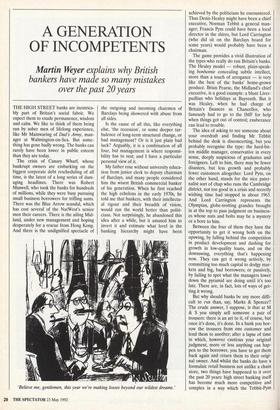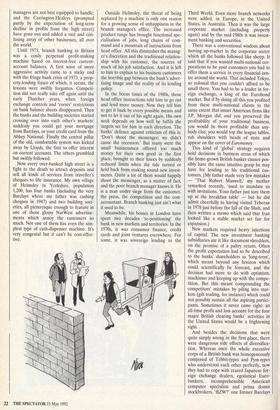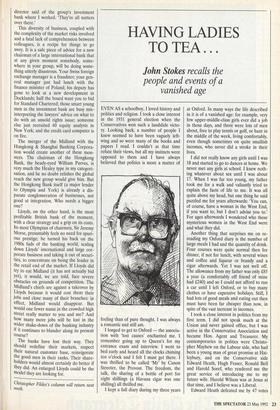A GENERATION OF INCOMPETENTS
Martin Weyer explains why British
bankers have made so many mistakes over the past 20 years
THE HIGH STREET banks are inextrica- bly part of Britain's social fabric. We expect them to exude permanence, wisdom and calm. We like to think of them being run by sober men of lifelong experience, like Mr Mainwaring of Dad's Army, man- ager at Walmington-on-Sea. But some- thing has gone badly wrong. The banks can rarely have been lower in public esteem than they are today.
The crisis of Canary Wharf, whose bankrupt owners are embarking on the biggest corporate debt rescheduling of all time, is the latest of a long series of dam- aging headlines. There was Robert Maxwell, who took the banks for hundreds of millions, while they were busy pursuing small business borrowers for trifling sums. There was the Blue Arrow scandal, which has cost several of the NatWest's senior men their careers. There is the ailing Mid- land, under new management and hoping desperately for a rescue from Hong Kong. And there is the undignified spectacle of the outgoing and incoming chairmen of Barclays being showered with abuse from all sides.
Is the cause of all this, like everything else, 'the recession', or some deeper tur- bulence of long-term structural change, or bad management? Or is it just plain bad luck? Arguably, it is a combination of all four, but management is where responsi- bility has to rest; and I have a particular personal view of it.
My father rose without university educa- tion from junior clerk to deputy chairman of Barclays, and many people considered him the wisest British commercial banker of his generation. When he first reached the high echelons in the early 1970s, he told me that bankers, with their intellectu- al rigour and their breadth of vision, would run the world better than politi- cians. Not surprisingly, he abandoned this idea after a while, but it amused him to invert it and estimate what level in the banking hierarchy might have been
`Believe me, gentlemen, this year we're making losses beyond our wildest dreams.'
achieved by the politicians he encountered. Thus Denis Healey might have been a chief executive, Norman Tebbit a general man- ager; Francis Pym could have been a local director in the shires, but Lord Carrington (who did sit on the Barclays board for some years) would probably have been a chairman.
The game provides a vivid illustration of the types who really do run Britain's banks. The Healey model — robust, plain-speak- ing bonhomie concealing subtle intellect, more than a touch of arrogance — is very like the best of the banks' home-grown
produce. Brian Pearse, the Midland's chief executive, is a good example: a blunt Liver- pudlian who holidays at Bayreuth. But it was Healey, when he had charge of Britain's finances as Chancellor, who famously had to go to the IMF for help when things got out of control; exuberance can lead to trouble.
The idea of asking to see someone about your overdraft and finding Mr Tebbit behind the desk is disconcerting, but you probably recognise the type: the hard-bit- ten middle manager, conservative in every sense, deeply suspicious of graduates and foreigners. Left to him, there may be fewer disasters, but less growth and probably fewer customers altogether. Lord Pym, on the other hand, stands for the nice pater- nalist sort of chap who runs the Cambridge district, not too good in a crisis and secretly wishing time had stopped in about 1963. And Lord Carrington represents the Olympian, globe-trotting grandee brought in at the top to pass judgment on business- es whose nuts and bolts may be a mystery or a bore to him.
Between the four of them they have the opportunity to get it wrong both on the upswing, by falling behind the competition in product development and dashing for growth in low-quality loans, and on the downswing, everything that's happening now. They can get it wrong actively, by committing too much capital to dodgy mar- kets and big, bad borrowers; or passively, by failing to spot what the managers lower down the pyramid are doing until it's too late. There are, in fact, lots of ways of get- ting it wrong.
But why should banks be any more diffi- cult to run than, say, Marks & Spencer?
The crude answer, I suppose, is that at M & S you simply sell someone a pair of trousers: there is an art to it, of course, but once it's done, it's done. In a bank you bor- row the trousers from one customer and lend them to another; after a lapse of time in which, however cautious your original judgment, more or less anything can hap- pen to the borrower, you have to get them back again and return them to their origi- nal owner. And whilst the banks do have a formulaic retail business not unlike a chain store, two things have happened to it over the past 20 years: high street banking itself has become much more competitive and complex in a way which the Tebbit-Pym managers are not best equipped to handle; and the Carrington-Healeys (prompted partly by the expectation of long-term decline in profits from the high street) have gone out and added a vast and con- fusing array of other businesses, all over the world.
Until 1971, branch banking in Britain was a cosily perpetual profit-making machine based on interest-free current- account balances. A first wave of more aggressive activity came to a sticky end with the fringe bank crisis of 1973, a prop- erty-lending fiasco of which, it seems, the lessons were swiftly forgotten. Competi- tion did not really take off again until the early Thatcher years, when foreign exchange controls and 'corset' restrictions on bank balance sheets disappeared. Then the banks and the building societies started crossing over into each other's markets: suddenly you could get your mortgage from Barclays, or your credit card from the Abbey National. Finally the central pillar of the old, comfortable system was kicked away by Lloyds, the first to offer interest on current accounts. The others grumbled but swiftly followed.
Now every over-banked high street is a fight to the death to attract deposits and sell all kinds of services from traveller's cheques to life insurance. My own village of Helmsley in Yorkshire, population 1,200, has four banks (including the very Barclays where my father was cashing cheques in 1947) and two building soci- eties, all picturesque enough to feature in one of those glossy NatWest advertise- ments which annoy the customers so much. Not one of them has even the sim- plest type of cash-dispenser machine. It's very congenial but it can't be cost-effec- tive. Outside Helmsley, the threat of being replaced by a machine is only one reason for a growing sense of unhappiness in the branch manager's office. The increased product range has brought functional spe- cialisation of jobs, long chains of com- mand and a mountain of instructions from head office. All this diminishes the manag- er's discretion and the traditional relation- ship with his customer, the sources of much of his job satisfaction. And it is left to him to explain to his business customers the horrible gap between the bank's adver- tising image and the reality of its lending policy.
In the boom times of the 1980s, those head office instructions told him to go out and lend more money. Now they tell him to get it back by every possible means and not to let it out of his sight again. His own neck depends on how well he fulfils the targets set for him in each direction. The banks' defence against criticism of this is: `Don't shoot the messenger; we didn't cause the recession.' But many were the small businessmen offered too much money for their own good in the first place, brought to their knees by suddenly reduced limits when the tide turned or held back from making sound new invest- ments. Quite a lot of them would happily shoot the messenger, as a matter of fact, and the poor branch manager knows it. He is a man under siege from the customer, the press, the competition and the cost- accountant. Branch banking just ain't what it used to be.
Meanwhile, his bosses in London have spent two decades 're-positioning' the bank in new markets and territories. In the 1970s, it was consumer finance, credit cards and joint ventures everywhere. For some, it was sovereign lending to the Third World. Even more branch networks were added, in Europe, in the United States, in Australia. Then it was the large corporate market (including property again) and by the mid-1980s it was invest- ment banking and securities.
There was a conventional wisdom about moving up-market in the corporate sector which all the banks followed like sheep. It said that if you wanted multi-national cor- porations to be your customers you had to offer them a service in every financial cen- tre around the world. That included Tokyo, so colossal that you couldn't afford to be small there. You had to be a leader in for- eign exchange, a king of the Eurobond market. But if by doing all this you profited from these multi-national clients to the same extent that smart American firms like J.P. Morgan did, and you preserved the profitability of your traditional business, you would be more profitable than any- body else; you would top the league tables, rub shoulders with heads of state and appear on the cover of Euromoney.
This kind of 'global' strategy requires bold decisions in business areas of which the home-grown British banker cannot pos- sibly have the same intuitive grasp he may have for lending to his traditional cus- tomers. (My father made very few mistakes — 'That Robert Maxwell,' my mother remarked recently, 'used to inundate us with invitations. Your father just tore them up at the breakfast table' — but he did admit cheerfully to having visited Teheran in 1978 just before the fall of the Shah, and then written a memo which said that Iran looked like a stable market set fair for expansion.) New markets required heavy injections of capital. The new investment banking subsidiaries ate it like document shredders, on the promise of a paltry return. Often the profit expectation had to be described to the banks' shareholders as 'long-term', which meant beyond any horizon which could scientifically be forecast, and the decision had more to do with optimism, machismo and keeping up with the compe- tition. But this meant compounding the competitors' mistakes by piling into mar- kets (gilt trading, for instance) which could not possibly sustain all the aspiring partici- pants. Sometimes it never came right: an all-time profit and loss account for the four major British clearing banks' activities in the United States would be a frightening sight.
And besides the decisions that were quite simply wrong in the first place, there were dangerous side effects of diversifica- tion. Whereas once the whole executive corps of a British bank was homogeneously composed of Tebbit-types and Pym-types who understood each other perfectly, now they had to cope with crazed Japanese for- eign exchange dealers, egotistical Euro- bankers, incomprehensible American computer specialists and prima donna stockbrokers. 'BZW?' one former Barclays director said of the group's investment bank where I worked. 'They're all nutters over there.'
This diversity of business, coupled with the complexity of the market risks involved and a fatal lack of comprehension between colleagues, is a recipe for things to go awry. It is a safe piece of advice for a new chairman of a large international bank that at any given moment somebody, some- where in your group, will be doing some- thing utterly disastrous. Your Swiss foreign exchange manager is a fraudster; your gen- eral manager just had lunch with the finance minister of Poland; his deputy has gone to look at a new development in Docklands; half the board want you to bid for Standard Chartered; those smart young men in the investment bank are busy mis- interpreting the lawyers' advice on what to do with an unsold rights issue; someone else just recruited 40 equity analysts in New York; and the credit card computer is on fire.
The merger of the Midland with the Hongkong & Shanghai Banking Corpora- tion would create another of these mon- sters. The chairman of the Hongkong Bank, the beady-eyed William Purves, is very much the Healey type in my categori- sation, and he no doubt relishes the global reach the new group would give him. But the Hongkong Bank itself (a major lender to Olympia and York) is already a dis- parate conglomeration of businesses, not good at integration. Who needs a bigger one?
Lloyds, on the other hand, is the most profitable British bank of the moment, with a clear strategy and a grip on its costs. Its most Olympian of chairmen, Sir Jeremy Morse, presumably feels no need for spuri- ous prestige; he turned his back on the 1980s fads of the banking world, scaling down Lloyds' international and large cor- porate business and taking it out of securi- ties, to concentrate on being the leader in the retail end of the market. If Lloyds did try to eat Midland (it has not actually bid yet), it would, we are told, face severe obstacles on grounds of competition. The Midland's chiefs are against a takeover by Lloyds because it would cost them their jobs and close many of their branches: in effect, Midland would disappear. But would one fewer name in the crowded high street really matter to you and me? And how many more jobs will be lost in the wider shake-down of the banking industry if it continues to blunder along its present course?
The banks have lost their way. They should redefine their markets, respect their natural customer base, reinvigorate the good men in their ranks. Their share- holders would almost certainly do better if they did. An enlarged Lloyds could he the model they are looking for.




































































 Previous page
Previous page